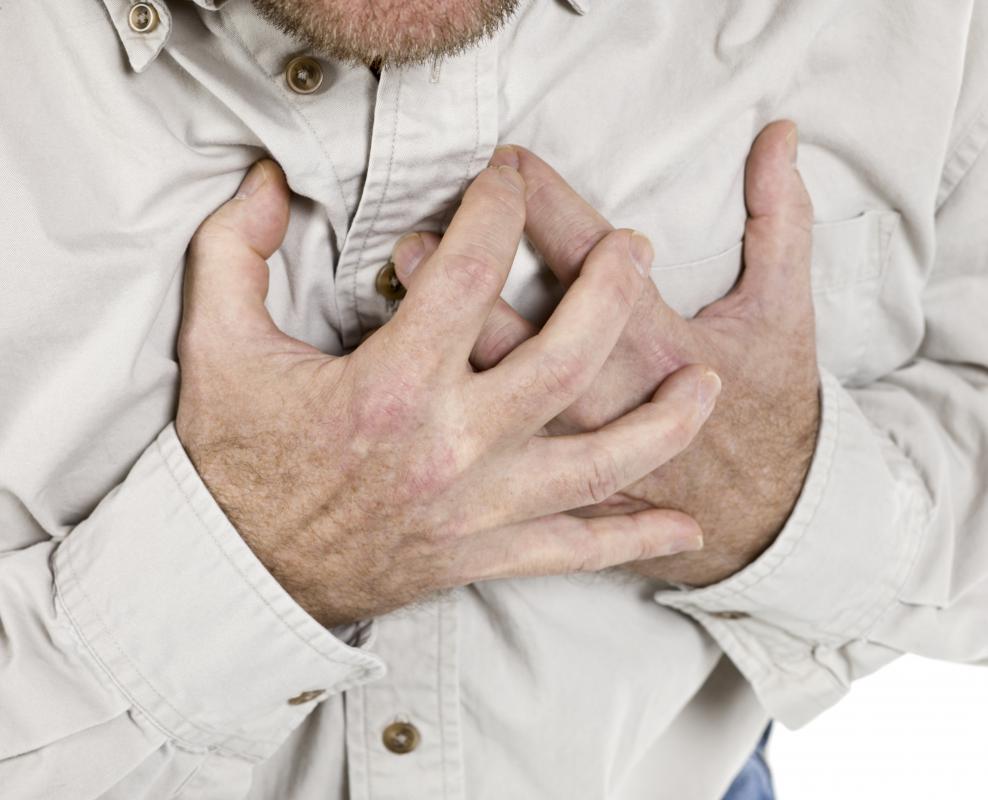At TheHealthBoard, we're committed to delivering accurate, trustworthy information. Our expert-authored content is rigorously fact-checked and sourced from credible authorities. Discover how we uphold the highest standards in providing you with reliable knowledge.
What is a Chest Tumor?
A chest tumor is an abnormal growth of cells found in the chest that could interfere with proper breathing and sometimes cause cancer. A chest tumor may be malignant, meaning it causes cancer or it may be benign or non-cancerous. Many non-cancerous chest tumors have no symptoms and may exist in the chest undetected. Some non-cancerous chest tumors may grow big enough to press on the lung and interfere with proper breathing.
A chest tumor may also be characterized as primary or secondary. A primary chest tumor originates from the bone and muscle of the chest and a secondary chest tumor originates from other parts of the body and spreads to the chest. Most chest tumors affect the walls of the chest and so most people refer to them as chest wall tumors.

There are no clear causes of chest wall tumors but some experts believe that they are inherited. Certain diet and lifestyle choices may also cause chest wall tumors. The main symptom of a chest wall tumor is a swelling or protrusion of the chest. Chest pain is also experienced by a patient but the pain is felt when the tumor is in an advanced stage.

A chest wall tumor is initially diagnosed by an x-ray. An x-ray simply shows the tumor but does not indicate where it originates from or whether it is cancerous or not. If an x-ray shows a tumor, a computed tomography (CT) or a magnetic resonance imaging (MRI) scan is used to indicate the size of the tumor, where it originates from, and whether or not it can cause cancer.

When all the information about the tumor is received, a biopsy is used to confirm it. A biopsy is a test that involves removing cell tissue from a tumor and examining it under a microscope and analyzing it chemically in a laboratory. The tumor tissue is removed using a needle in a procedure called a needle biopsy. If it is not possible to remove the tissue through a needle biopsy, the patient may undergo a surgical procedure to remove the tissue, a procedure called surgical biopsy.

Treatment of a chest wall tumor is usually determined by the type and size of tumor. A non-cancerous chest wall tumor can be removed through surgery. If the tumor is cancerous, it may be treated through chemotherapy, radiation therapy or surgery or a combination of any of the three. The best mode of treatment is decided by medical experts found in a chest tumor clinic.
AS FEATURED ON:
AS FEATURED ON:
















Discussion Comments
I have lump right above my nipple, about the size of a nickel. What should I do about it
the info was helpful. I had a chest wall tumor which is benign. I got surgery but they could not remove all and now I feel so much pain. I am wondering if there is any way to relieve that pain or will I need a surgery again?
Pets can get tumors on their chest too, although they're not usually the same kind as people get.
Just so you know, the signs of chest tumors in dogs and cats are shortness of breath, lameness that comes and goes, coughing, and a reluctance to exercise.
So that means all bets are off is you have an English bulldog, since they're like that all the time -- just kidding!
But seriously, do be aware of your pet's health, and take them to get checked out if they're looking under the weather.
Pets are members of the family, and should be treated as such.
@galen84basc -- I don't know the symptoms of a chest cavity tumor, but I'm pretty sure that a chest cavity tumor and a lung carcinoma are not related, so you should be OK.
You can still Xray your chest if you want to though, just to be safe.
What would be some of the symptoms of a tumor in the chest cavity?
Now that you say these things could be hereditary I want to get an X-ray of my chest; my grandmother had a lung tumor!
Post your comments